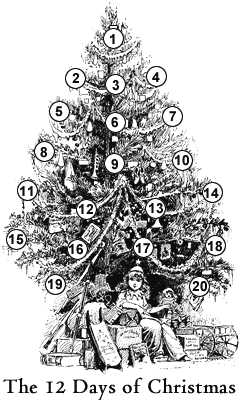Nineteenth Day of Christmas - Catholic Culture 
January 12, Christmas Weekday. God is your beatitude. The things of time are toys. You are eternity's child and your eternity has already begun! There is a ...
 January 12, Christmas Weekday  God is your beatitude. The things of time are toys. You are eternity's child and your eternity has already begun! There is a compelling urgency to every day and every hour of the day. In it we are to witness to the truth – that God greeted and gifted us at Christmas. God is your beatitude. The things of time are toys. You are eternity's child and your eternity has already begun! There is a compelling urgency to every day and every hour of the day. In it we are to witness to the truth – that God greeted and gifted us at Christmas.
If you know what witness means, you understand why God brings St. Stephen, St. John, and the Holy Innocents to the crib in the cave as soon as Christ is born liturgically. To be a witness is to be amartyr. Holy Mother Church wishes us to realize that we were born in baptism to become Christ – He who was the world's outstanding Martyr. – Love Does Such Things, by Rev. M. Raymond, O.C.S.O.
|  |
January 12 - Christmas Weekday
Christmas Weekday
1 John 5:14-21 + Psalm 149 + John 3:22-30
January 12, 2013
“All wrongdoing is sin, but there is sin that is not deadly.” [1 John 5:17]
On this last weekday of the Christmas Season, our First Reading consists of the final eight verses of the First Epistle of Saint John. It seems to end on an odd note: “Children, be on your guard against idols.” St. John offers no words of farewell and gives no specific instructions. Of course, the 21 New Testament books commonly called “epistles” were not written by their human authors according to a single format. St. Paul’s epistles are much closer in form to the manner in which you or I write a letter (or email) today. St. John, on the other hand, writes his first epistle about some general Christian beliefs: most especially God’s divine nature as Love.
The Beloved Disciple’s warning against idolatry, then, can be seen as a defense of true love. To love any creature in the manner in which we ought to love the Creator is idolatry. Even the most authentic of human loves (maternal, paternal, filial or spousal) is of a completely different caliber than a Christian’s love for the Most Blessed Trinity. To put a human relationship before one’s relationship with God is to forget that God is in every sense the root of every human love. Without putting one’s relationship with God first, human relationships begin to wither on the vine, or to extend the Beloved Disciple’s metaphor, to harden into an idol.

No comments:
Post a Comment